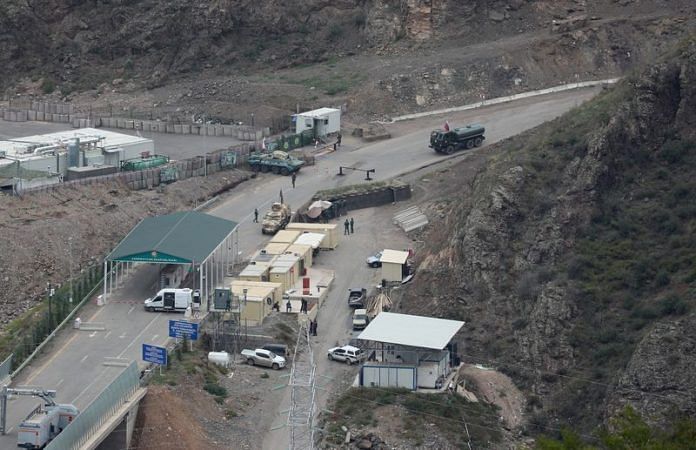By Felix Light and Guy Faulconbridge
NEAR KORNIDZOR, Armenia (Reuters) -The 120,000 ethnic Armenians of Nagorno-Karabakh will leave for Armenia as they do not want to live as part of Azerbaijan and fear ethnic cleansing, the leadership of the breakaway region told Reuters on Sunday.
The Armenians of Karabakh, a territory internationally recognised as part of Azerbaijan but beyond Baku’s control since the breakup of the Soviet Union, were forced to declare a ceasefire on Sept. 20 after a lightning 24-hour military operation by the much larger Azerbaijani military.
Azerbaijan says it will guarantee their rights and integrate the region but the leadership of the Armenians in Karabakh told Reuters that they would leave. Azerbaijan has repeatedly denied any intention to harm them.
“Our people do not want to live as part of Azerbaijan. Ninety-nine point nine percent prefer to leave our historic lands,” David Babayan, an adviser to Samvel Shahramanyan, the president of the self-styled Republic of Artsakh, told Reuters.
He said it was unclear when the Karabakh Armenians would move down the Lachin corridor which links the territory to Armenia, where Prime Minister Nikol Pashinyan has faced calls to resign for failing to save Karabakh.
“The fate of our poor people will go down in history as a disgrace and a shame for the Armenian people and for the whole civilised world,” Babayan said. “Those responsible for our fate will one day have to answer before God for their sins.”
The process of giving up the weapons of the ethnic Armenian fighters is underway, Babayan said.
The exodus of so many people from Karabakh ushers in yet another twist to the tumultuous history of the mountainous area, which over the centuries has come under the sway of Persians, Turks, Russians, Ottomans and Soviets.
It could also change the delicate balance of power in the South Caucasus region, a patchwork of ethnicities crisscrossed with oil and gas pipelines where Russia, the United States, Turkey and Iran are jostling for influence.
AZERI VICTORY
Last week’s Azerbaijani victory appears to bring a decisive end to one of the decades-old “frozen conflicts” of the Soviet Union’s dissolution. President Ilham Aliyev said his iron fist had consigned the idea of an independent ethnic Armenian Karabakh to history and that the region would be turned into a “paradise” as part of Azerbaijan.
Armenia says more than 200 people were killed and 400 wounded in the Azerbaijani military operation. The fate of the ethnic Armenian population has raised concerns in Moscow, Washington and Brussels.
Nagorno-Karabakh, known as Artsakh by Armenians, was claimed by both Azerbaijan and Armenia after the fall of the Russian Empire in 1917. In Soviet times it was designated an autonomous region within Azerbaijan.
As the Soviet Union crumbled, the Armenians there threw off Azeri control and captured neighbouring territory in what is now known as the First Karabakh War. From 1988-1994 about 30,000 people were killed and more than a million people, mostly Azeris, displaced.
In 2020, after decades of skirmishes, Azerbaijan, backed by Turkey, won a decisive 44-day Second Karabakh War, swiftly breaking through Armenian defences and recapturing territory in and around Karabakh. That war ended with a Russian-brokered peace deal, which Armenians accuse Moscow of failing to guarantee.
The Armenian authorities in the region said late on Saturday that about 150 tons of humanitarian cargo from Russia and another 65 tons of flour shipped by the International Committee of the Red Cross had arrived in the region.
“Given the scale of humanitarian needs, we are increasing our presence there with specialized personnel in health, forensics, protection, and weapons contamination,” the ICRC said in a statement.
With 2,000 peacekeepers in the region, Russia said that under the terms of the ceasefire six armoured vehicles, more than 800 small arms, anti-tank weapons and portable air defence systems, as well as 22,000 ammunition rounds had been handed in by Saturday.
Armenia’s Pashinyan, who has publicly accused Russia of failing to support Armenia, said on Friday space for 40,000 people from Karabakh had been prepared in Armenia.
Azerbaijan, which is mainly Muslim, has said the Armenians, who are Christian, can leave if they want.
Ambulances evacuated some of the wounded from Nagorno-Karabakh to Armenia, Russian news agency Interfax reported on Sunday, citing Armenia’s health ministry.
U.S. Secretary of State Antony Blinken, who has held urgent talks with Armenia and Azerbaijan, said on social media: “The United States will continue its steadfast support for Armenia and its sovereignty and territorial integrity.”
(Reporting by Felix Light near KORNIDZOR in Armenia and Guy Faulconbridge in MoscowWriting by Lidia Kelly and Guy FaulconbridgeEditing by William Mallard and Peter Graff)
Disclaimer: This report is auto generated from the Reuters news service. ThePrint holds no responsibilty for its content.



